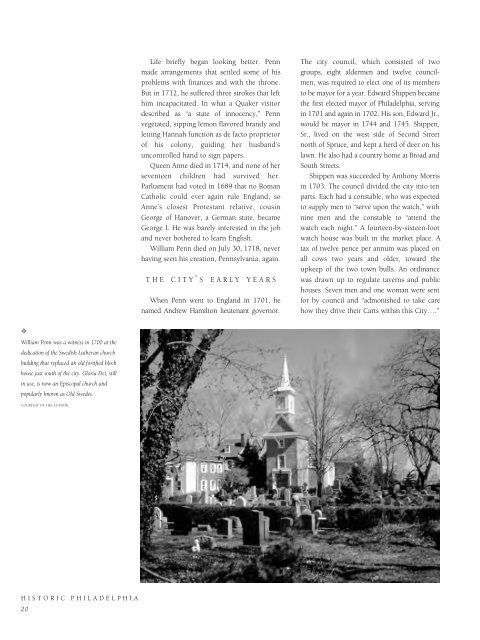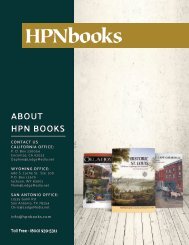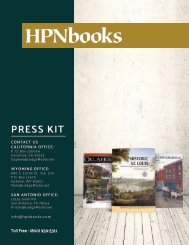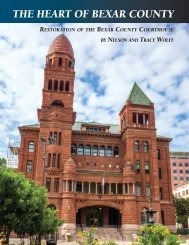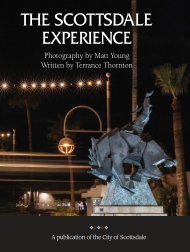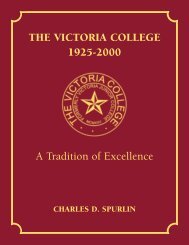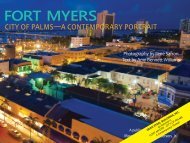Historic Philadelphia
An illustrated history of the city of Philadelphia, paired with the histories of companies, families and organizations that make the region great.
An illustrated history of the city of Philadelphia, paired with the histories of companies, families and organizations that make the region great.
You also want an ePaper? Increase the reach of your titles
YUMPU automatically turns print PDFs into web optimized ePapers that Google loves.
Life briefly began looking better. Penn<br />
made arrangements that settled some of his<br />
problems with finances and with the throne.<br />
But in 1712, he suffered three strokes that left<br />
him incapacitated. In what a Quaker visitor<br />
described as “a state of innocency,” Penn<br />
vegetated, sipping lemon flavored brandy and<br />
letting Hannah function as de facto proprietor<br />
of his colony, guiding her husband’s<br />
uncontrolled hand to sign papers.<br />
Queen Anne died in 1714, and none of her<br />
seventeen children had survived her.<br />
Parliament had voted in 1689 that no Roman<br />
Catholic could ever again rule England, so<br />
Anne’s closest Protestant relative, cousin<br />
George of Hanover, a German state, became<br />
George I. He was barely interested in the job<br />
and never bothered to learn English.<br />
William Penn died on July 30, 1718, never<br />
having seen his creation, Pennsylvania, again.<br />
THE CITY’ S EARLY YEARS<br />
When Penn went to England in 1701, he<br />
named Andrew Hamilton lieutenant governor.<br />
The city council, which consisted of two<br />
groups, eight aldermen and twelve councilmen,<br />
was required to elect one of its members<br />
to be mayor for a year. Edward Shippen became<br />
the first elected mayor of <strong>Philadelphia</strong>, serving<br />
in 1701 and again in 1702. His son, Edward Jr.,<br />
would be mayor in 1744 and 1745. Shippen,<br />
Sr., lived on the west side of Second Street<br />
north of Spruce, and kept a herd of deer on his<br />
lawn. He also had a country home at Broad and<br />
South Streets.<br />
Shippen was succeeded by Anthony Morris<br />
in 1703. The council divided the city into ten<br />
parts. Each had a constable, who was expected<br />
to supply men to “serve upon the watch,” with<br />
nine men and the constable to “attend the<br />
watch each night.” A fourteen-by-sixteen-foot<br />
watch house was built in the market place. A<br />
tax of twelve pence per annum was placed on<br />
all cows two years and older, toward the<br />
upkeep of the two town bulls. An ordinance<br />
was drawn up to regulate taverns and public<br />
houses. Seven men and one woman were sent<br />
for by council and “admonished to take care<br />
how they drive their Carts within this City….”<br />
✧<br />
William Penn was a witness in 1700 at the<br />
dedication of the Swedish Lutheran church<br />
building that replaced an old fortified block<br />
house just south of the city. Gloria Dei, still<br />
in use, is now an Episcopal church and<br />
popularly known as Old Swedes.<br />
COURTESY OF THE AUTHOR.<br />
HISTORIC PHILADELPHIA<br />
20


